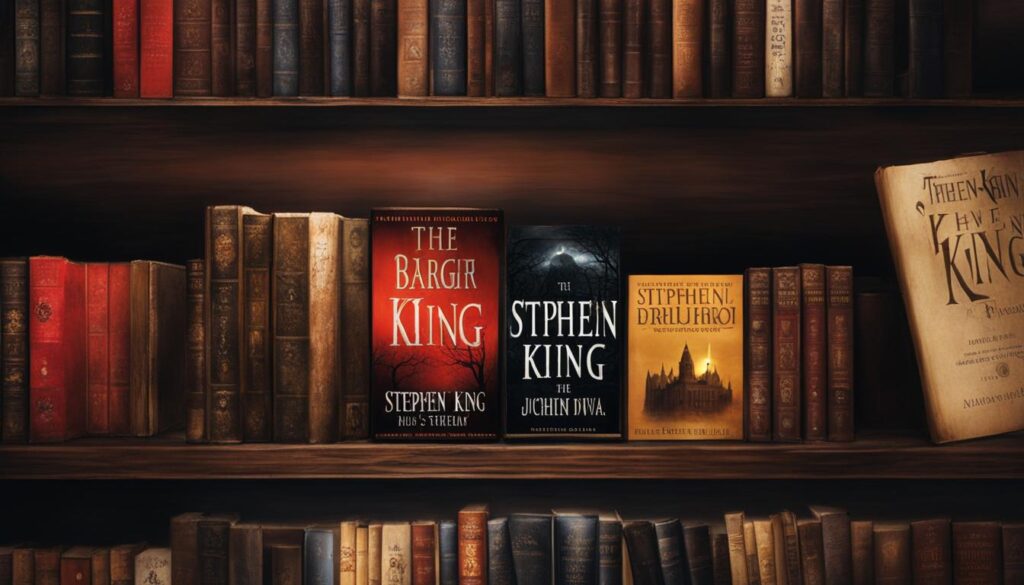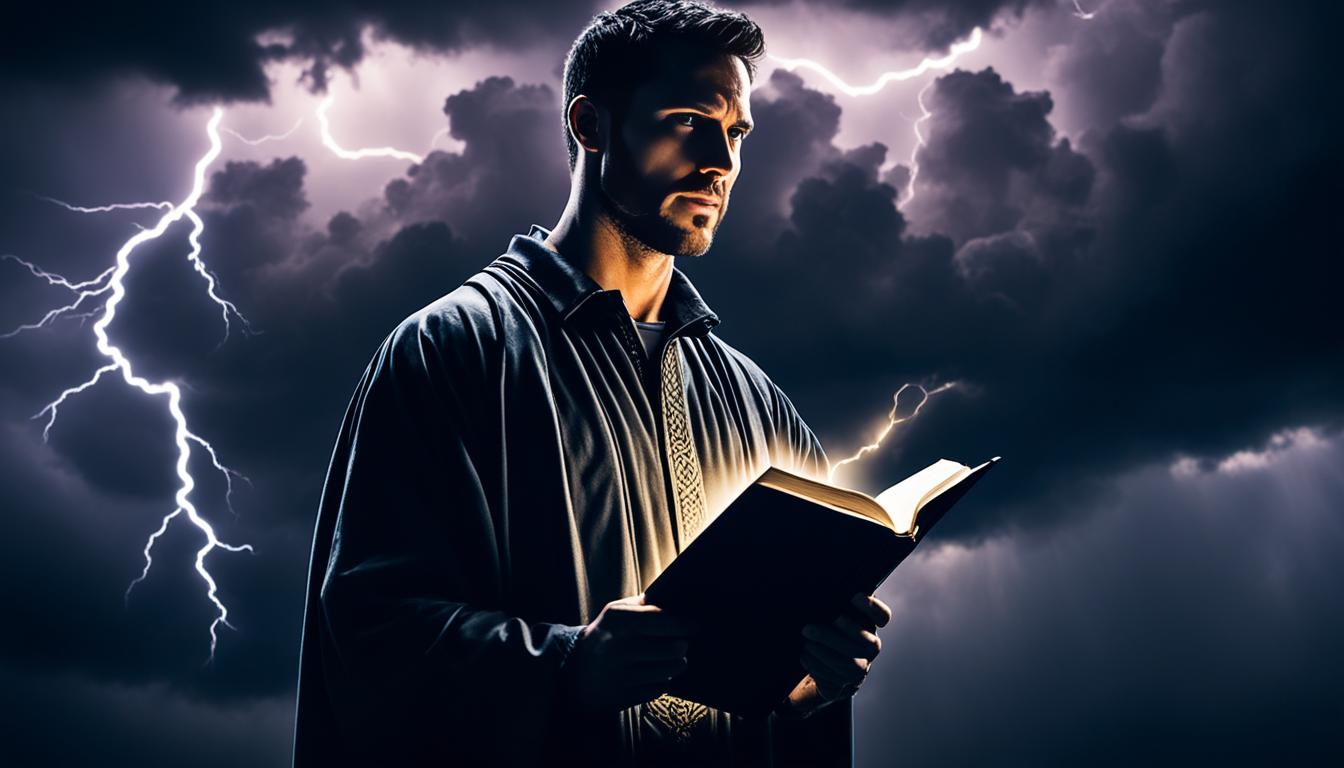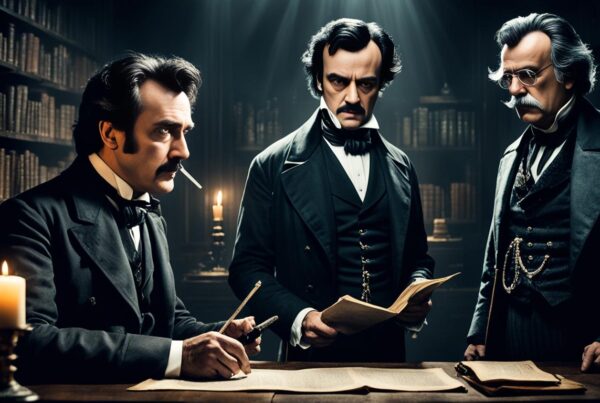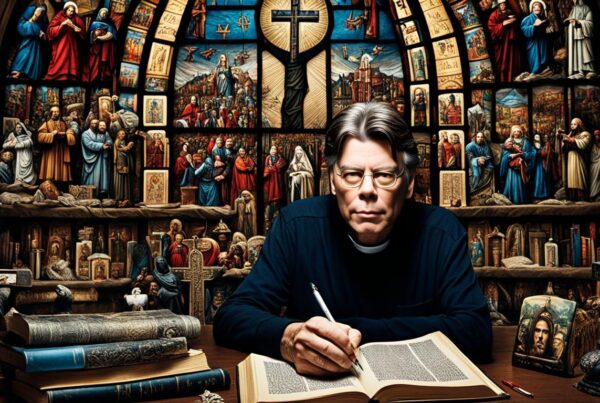Stephen King’s literature has captivated readers for decades with its gripping storytelling and masterful crafting of horror and suspense. However, what many readers may not know is that King’s work is heavily infused with Christian themes that contribute to the depth and complexity of his narratives.
From his depictions of the struggle between good and evil to his exploration of redemption and forgiveness, King’s works delve into religious concepts that add a layer of meaning and significance to his storytelling.
In this article, we will take a closer look at the Christian themes present in Stephen King’s literature and examine how they contribute to the richness of his stories.
Key Takeaways
- Stephen King’s work is infused with Christian themes that add depth to his storytelling.
- Religious concepts such as the struggle between good and evil and redemption and forgiveness are explored in King’s literature.
- King’s nuanced exploration of Christian themes has influenced other authors and contributed to the broader landscape of religious storytelling in literature.
The Role of Religion in Stephen King’s Fiction
Religion permeates Stephen King’s fiction, shaping the narratives and characters within his books. King often explores religious concepts and beliefs in a sophisticated and nuanced way, whether it be through allegory, symbolism or direct references to religious texts and figures.
King’s use of religion in his storytelling adds depth and complexity to his characters. Religion is often used as a motivator, driving characters to make decisions based on a particular set of beliefs or values. It can also be used as a source of conflict, pitting characters with differing religious beliefs against each other.
Furthermore, religion can be used to explore deep philosophical questions and the nature of humanity. Many of King’s works deal with existential themes, such as life after death, the existence of evil, and the possibility of salvation. These issues are often deeply tied to religious beliefs and teachings.
Overall, religion plays a significant role in Stephen King’s fiction, enriching his storytelling and providing an avenue for exploring complex themes and ideas. The intertwining of religious concepts and storytelling is a hallmark of King’s work and is a testament to his skill as a writer.
Good vs. Evil: Biblical Archetypes in King’s Work
One of the most significant and recurring themes in Stephen King’s books is the timeless battle between good and evil. Often, the author portrays this struggle through characters that represent biblical archetypes, adding a fascinating religious layer to his storytelling.
Through these characters, King explores concepts such as sin, redemption, and forgiveness, providing readers with a powerful visual representation of the Christian morality that underpins his work. For example, characters like Randall Flagg from “The Stand” embody the very essence of evil, while others like Mother Abigail represent the epitome of good.
“You never know what worse luck your bad luck has saved you from.”
King’s use of biblical archetypes to represent the struggle between good and evil allows readers to connect more easily with his stories while providing fascinating insights into the human psyche and Christian morality. Characters’ motivations and actions are more relatable, as readers can reflect on their own moral values and how they would react in similar situations.
This struggle is particularly evident throughout King’s magnum opus, “The Dark Tower” series, where it is the central theme of the entire narrative struct
Redemption and Forgiveness in King’s Stories
In Stephen King’s literature, themes of redemption and forgiveness are common and deeply woven into the narrative arcs of his characters. These concepts have a significant impact on the overall themes of his books, often contributing to the moral complexity and nuance of the storytelling.
Through their journeys of redemption and quest for forgiveness, King’s characters grapple with the consequences of their actions and attempt to make amends for past wrongs. This struggle between past mistakes and the desire to make things right creates compelling and emotional stories.
One example of redemption in King’s work can be found in his novel The Shawshank Redemption, where the main character, Andy Dufresne, is wrongly accused and imprisoned for a crime he did not commit. Despite facing immense adversity and brutality in prison, Andy eventually finds a way to prove his innocence and is redeemed in the eyes of society.
Forgiveness is also explored in King’s literature, often in relation to the characters seeking redemption. The act of forgiving oneself or others for past mistakes allows characters to move forward and find a sense of peace, despite the pain and trauma they have experienced.
Overall, the themes of redemption and forgiveness in Stephen King’s literature highlight the complexities of human nature and the power of second chances. Through his expert storytelling, King offers a nuanced exploration of these concepts that resonates with readers and remains relevant to this day.
Sin and Guilt: Exploring the Dark Side
As a recurring theme in Stephen King’s books, sin and guilt add a layer of complexity to the portrayal of his characters. King’s literature often focuses on the psychological effects of sin, with characters grappling with the consequences of their actions. The exploration of sin and guilt adds depth to the moral ambiguity of the characters, making them more relatable and realistic.
The presentation of sin is often graphic and disturbing, reflecting the intense darkness of human nature. The way that King approaches sin is thought-provoking, showcasing the inner turmoil that drives characters to commit unthinkable acts. In contrast, guilt is characterized by the inescapable weight it places on the mind of the guilty party. It is portrayed as a force that consumes and destroys, often leading characters down paths of destruction.
One of the most notable examples of sin and guilt in Stephen King’s literature is the character Annie Wilkes in Misery. Annie’s obsession with Paul Sheldon, including her actions to “keep him forever,” reveal the depths of her tortured mind. The sin in her heart is palpable as she tortures Sheldon, lashing out when her delusions are challenged, and guilt invades her thoughts when Sheldon tries to flee from her possession.
Through his exploration of sin and guilt, Stephen King creates characters with deep-seated flaws, highlighting the dark side of human nature. This exploration is one of the essential aspects of his storytelling, drawing in readers with gripping tales that present issues of right and wrong with underworld overtones.
Divine Intervention and Miracles in King’s Narratives
In Stephen King’s literature, divine intervention and miracles are not uncommon occurrences that give rise to some of the most imaginative and stimulating content. These supernatural events create a powerful and thought-provoking storytelling experience that beautifully merge with Christian themes, making the novels and stories instantly captivating.
The concept of miracles has a significant religious background and has been an integral part of storytelling since ancient times. King has skillfully utilized this idea in his work, bringing an intriguing and unique perspective to the narration, making it more engaging.
Several of King’s works, such as “The Green Mile” and “Revival,” stand out for their explicit portrayal of divine intervention. These novels explore the intersection between Christian themes and supernatural occurrences, imbuing the stories with a distinct sense of the miraculous, which often leaves readers questioning what will happen next.
“The Green Mile” is a prime example of how King uses divine intervention in his work. Characters often turn to prayer and the hope of a miracle when the situation seems to be out of their control. These elements are woven into the narrative, adding depth to the storyline and giving the reader a spiritual connection to the story’s characters.
While King’s works often feature a darker side, his portrayal of divine intervention offers a glimmer of hope. The miracles and the attempts to explain them illustrate humankind’s search for meaning in the face of overwhelming challenges.
This exploration of divine intervention and miracles contributes to Stephen King’s status as a master of the horror genre. His ability to blend supernatural events and Christian themes into his storytelling creates a unique reading experience that has become a hallmark of his works.
The Afterlife and Existence of Heaven and Hell
Stephen King’s portrayal of the afterlife and belief in heaven and hell within his novels align with Christian teachings, contributing to the overall thematic exploration. The concept of the afterlife is prominent in several of King’s books, including “The Green Mile” and “Revival”. These novels depict both positive and negative afterlife experiences, exploring the duality of heaven and hell.
In “The Dark Tower” series, King introduces the concept of multiple afterlives, where individuals experience their own unique afterlife based on their individual beliefs and actions. This portrayal aligns with the Christian belief that individuals are judged based on their deeds and are sent to either heaven or hell accordingly.
The belief in the afterlife and the existence of heaven and hell are recurring themes in King’s work. They add a layer of complexity to the narratives and characters and reflect the overarching exploration of Christian themes present throughout his literature.
The Power of Faith and Belief in King’s Fiction
Stephen King’s literature is a testament to the power of faith and belief in shaping narrative arcs. The characters in his works often embark on journeys of faith that have a significant impact on the overarching storyline. Through these characters, King explores the complexity and nuance of Christian themes, such as redemption, forgiveness, and sin. The power of faith in his writing transcends any religious affiliation, as it speaks to the universal human experience of grappling with questions of morality and spirituality.
One of the most notable examples of this is in King’s novel “The Stand,” where the characters’ faith plays a critical role in the narrative. The character of Mother Abagail serves as a spiritual leader who guides a group of survivors through a dystopian world ravaged by a catastrophic virus. Her unwavering faith serves as a beacon of hope for the characters, helping them to navigate the challenges they face.
In other works, such as “Carrie” and “The Shawshank Redemption,” King explores the transformative power of belief and the ability of characters to find redemption through faith. These narratives illustrate King’s ability to create complex characters whose journeys of faith add depth and dimension to the story.
The significance of faith and belief in King’s work extends beyond the purely narrative. It represents a broader exploration of spirituality and its effect on the human experience. It speaks to the inherent belief shared by all humans that there is something greater than themselves, and that there is a purpose to their lives. As such, King’s exploration of faith and belief is not just limited to Christian themes; it resonates with readers across all belief systems and backgrounds.
King’s work demonstrates the power of literature to explore complex ideas and themes, such as faith and belief. His nuanced portrayal of religious themes adds depth to his narratives and underscores the significance of grappling with questions of morality and spirituality, regardless of one’s personal beliefs. Through his work, he has cemented his place as one of the great storytellers of our time.
Criticism and Controversy Surrounding King’s Religious Themes
Despite the acclaim that Stephen King’s works receive, his exploration of religious themes hasn’t been without criticism or controversy. Some have accused him of using Christianity as a plot device to generate horror, while others argue that he has failed to represent Christian teachings accurately.
“King’s portrayal of religion seems superficial, and his use of Christian concepts as elements of horror fiction has understandably made some believers uncomfortable.”
On the other hand, some literary critics applaud King’s use of religious themes, arguing that it elevates his work beyond the typical horror genre and enriches the narrative by exploring questions of morality and spirituality.
“King’s exploration of religious themes brings a level of depth and complexity to his works that can be both thought-provoking and unsettling.”
The controversy surrounding King’s representation of religious themes raises questions about the role of religion in literature and the interpretation of Christian concepts in popular culture. However, it is undeniable that King’s work has made a significant impact on the horror genre and contributed to the ongoing conversation about the power of storytelling.

Impact and Legacy: Stephen King’s Influence on Christian Fiction
Stephen King’s exploration of Christian themes has made a significant impact on the literary world. His ability to intertwine religious concepts and beliefs with compelling storytelling has influenced numerous authors in the Christian fiction genre.
King’s nuanced exploration of complex characters struggling with faith and morality has opened the door for more in-depth and thought-provoking discussions within Christian fiction. His use of biblical archetypes and exploration of good versus evil has redefined the boundaries of this genre.
While controversy sometimes surrounds his portrayal of religious themes, King’s influence on literature cannot be overlooked. His work has challenged readers to consider the role of faith and belief in storytelling and has paved the way for a new era of Christian fiction.
In conclusion, Stephen King’s impact on Christian fiction and literature, in general, is undeniable. His exploration of religious themes and complex characters has inspired and influenced authors for decades. It will be exciting to see how his legacy will continue to shape the future of Christian storytelling.



